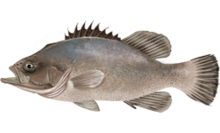
Sweepers are small, tropical marine ray-finned fish of the family Pempheridae. Found in the western Atlantic Ocean and Indo-Pacific region, the family contains about 26 species in two genera. One species is the target of subsistence fisheries in Japan, where the fish is much enjoyed for its taste. Sweepers are occasionally kept in marine aquaria.

Menticirrhus is a genus of marine ray-finned fish belonging to the family Sciaenidae, the drums or croakers. They are commonly known as kingcroakers or kingfish. These fish are found in the Western Atlantic and Eastern Pacific Oceans.
Zoarces is a genus of marine ray-finned fishes belonging to the family Zoarcidae, the eelpouts. It is the only genus in the subfamily Zoarcinae. These eelpouts are found in the northern Atlantic and northern Pacific Oceans.
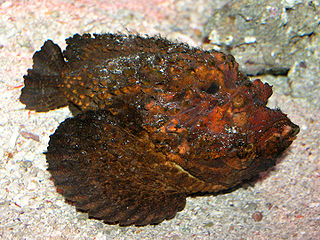
Synanceiinae is a subfamily of venomous ray-finned fishes, waspfishes, which is classified as part of the family Scorpaenidae, the scorpionfishes and their relatives. These fishes are found in the Indo-Pacific oceans. They are primarily marine, though some species are known to live in fresh or brackish waters. The various species of this family are known informally as stonefish, stinger, stingfish and ghouls. Its species are known to have the most potent neurotoxins of all the fish venoms, secreted from glands at the base of their needle-like dorsal fin spines. The vernacular name, stonefish, for some of these fishes derives from their behaviour of camouflaging as rocks. The type species of the family is the reef stonefish.
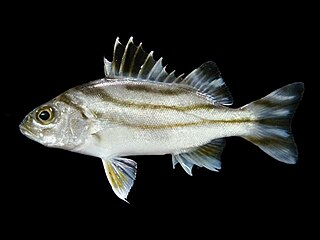
Grunters or tigerperches are ray-finned fishes in the family Terapontidae. This family is part of the superfamily Percoidea of the order Perciformes.

Trichogaster is a genus of gouramis native to South Asia from Pakistan to Myanmar. It is the only genus in the monotypic subfamily Trichogastrinae as set out in the 5th Edition of Fishes of the World, although that book states that there are two genera, the other being Colisa which is treated as a synonym of Trichogaster by Fishbase and the Catalog of Fishes. Fishbase also places the genus in the Luciocephalinae. Species of this genus are very popular in the aquarium trade.
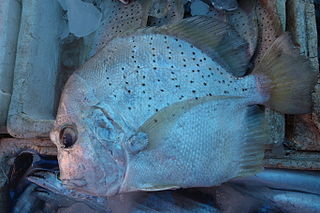
Drepane is a genus of marine and brackish water ray-finned fishes, known commonly as the sicklefishes. It is the only genus in the monotypic percomorph family Drepaneidae. These fish occur in the Indian and western Pacific Oceans, and in the eastern Atlantic near Africa.

Pseudolabrus is a genus of wrasses native to the eastern Indian Ocean and the Pacific Ocean.

Oplegnathus is currently the sole recognized genus in the knifejaw family (Oplegnathidae) of marine centrarchiform ray-finned fishes. The largest, the Cape knifejaw, can reach a maximum length around 90 cm (35 in). Knifejaws have teeth fused into a parrot-like beak in adulthood. They feed on barnacles and mollusks, and are fished commercially. They are native to the Indian and Pacific Oceans.

Cephalopholis is a genus of marine ray-finned fish, groupers from the subfamily Epinephelinae in the family Serranidae, which also includes the anthias and sea basses. Many of the species have the word "hind" as part of their common name in English.

Plectropomus, commonly known as the coral groupers, is a genus of marine ray-finned fish, groupers from the subfamily Epinephelinae, part of the family Serranidae, which also includes the anthias and sea basses. They are found in the Indo-Pacific region.

Hemitripterus is a genus of marine ray-finned fishes, sculpins, belonging to the subfamily Hemitripterinae which is part of the family Agonidae. These fishes are found in the North Pacific and Northwest Atlantic Oceans.

Pseudocaranx is a genus of ray-finned fishes from the family Carangidae, the jacks, trevallies, scads, and pompanos. They occur in the western Atlantic Ocean and the Indo-Pacific.

Selene is a genus of carangids, commonly known as lookdowns and moonfishes, native to the Atlantic Ocean and the eastern Pacific Ocean.
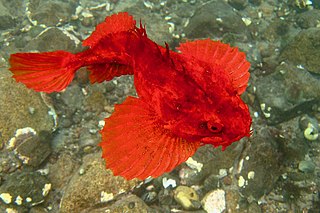
Hemitripterus americanus, the sea raven, is a species of marine ray-finned fish belonging to the subfamily Hemitripterinae of the family Agonidae. The sea raven is found along the Atlantic coast of North America.

Scorpis is a genus of marine ray-finned fish from the family Scorpididae which are native to the eastern Indian Ocean and the Pacific Ocean.

Pentaceros is a genus of marine ray-finned fish, armorheads from the family Pentacerotidae. They are native to the Pacific, Indian, and eastern Atlantic Oceans. Pentaceros is the only genus in the monotypic subfamily Pentacerotinae.
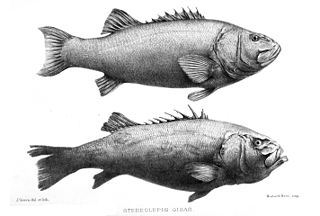
Stereolepis is a genus of marine ray-finned fish native to the Pacific Ocean. It is the only valid genus in the family Stereolepididae in the order Acropomatiformes.

The school bass is a species of marine ray-finned fish, it is the only member of the monotypic genus Schultzea which is part of the subfamily Serraninae which itself is classified within the family Serranidae, along with the anthias and groupers. It is found in the western central Atlantic Ocean. This species is found in deeper waters near coral reefswhere it forms small groups which feed on plankton. The school bass is a synchronous hermaphrodite. The generic name honours the American ichthyologist Leonard Peter Schultz (1901-1986) who was Curator of Fishes at the United States National Museum who examined the specimens described by Loren P. Woods (1914-1979) as Schultzea campachanus, which was later shown to be a synonym of Hildebrand's Serranus beta.

Eques is a small genus of marine ray-finned fishes belonging to the family Sciaenidae, the drums and croakers. These fishes are found in the Western Atlantic Ocean.
